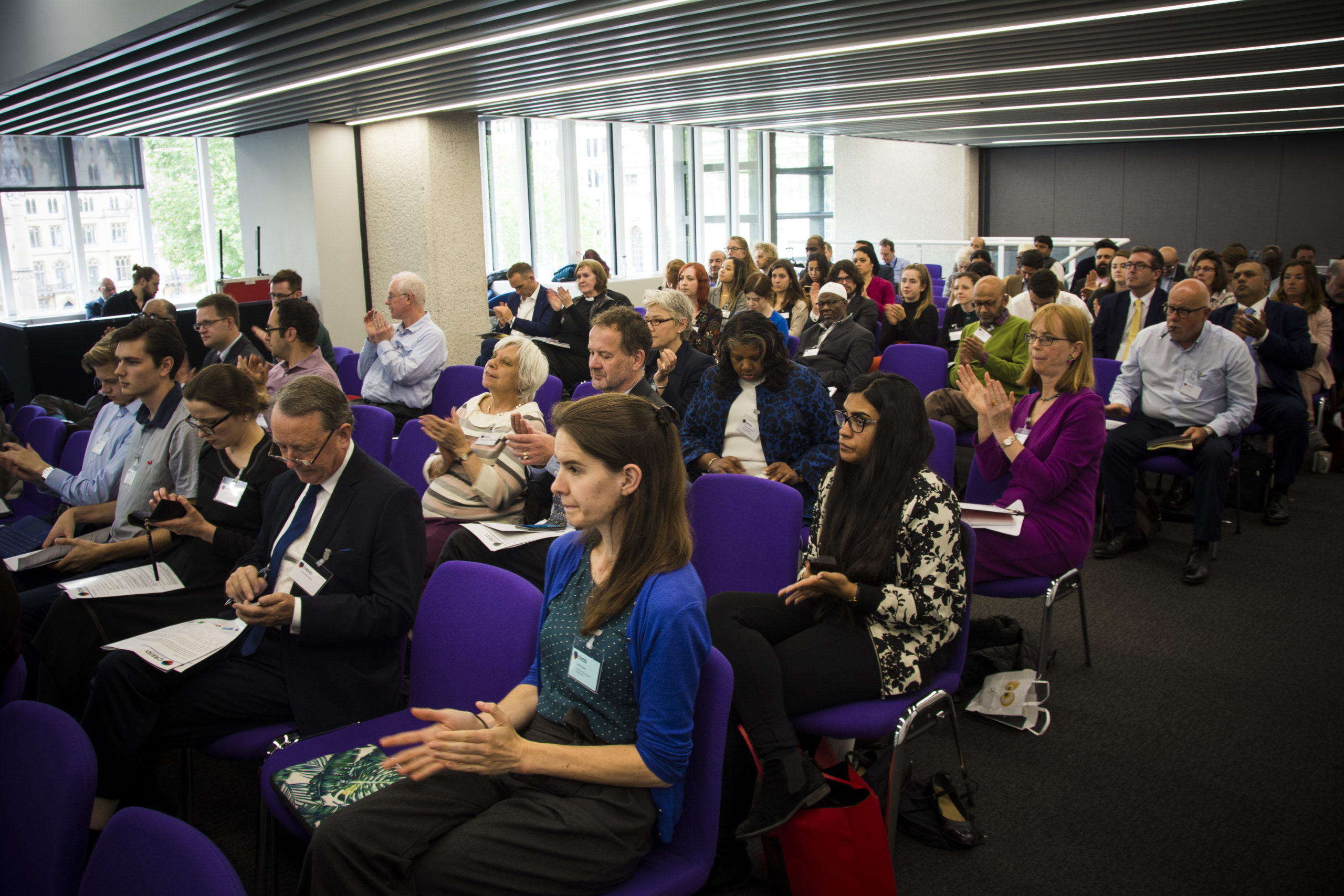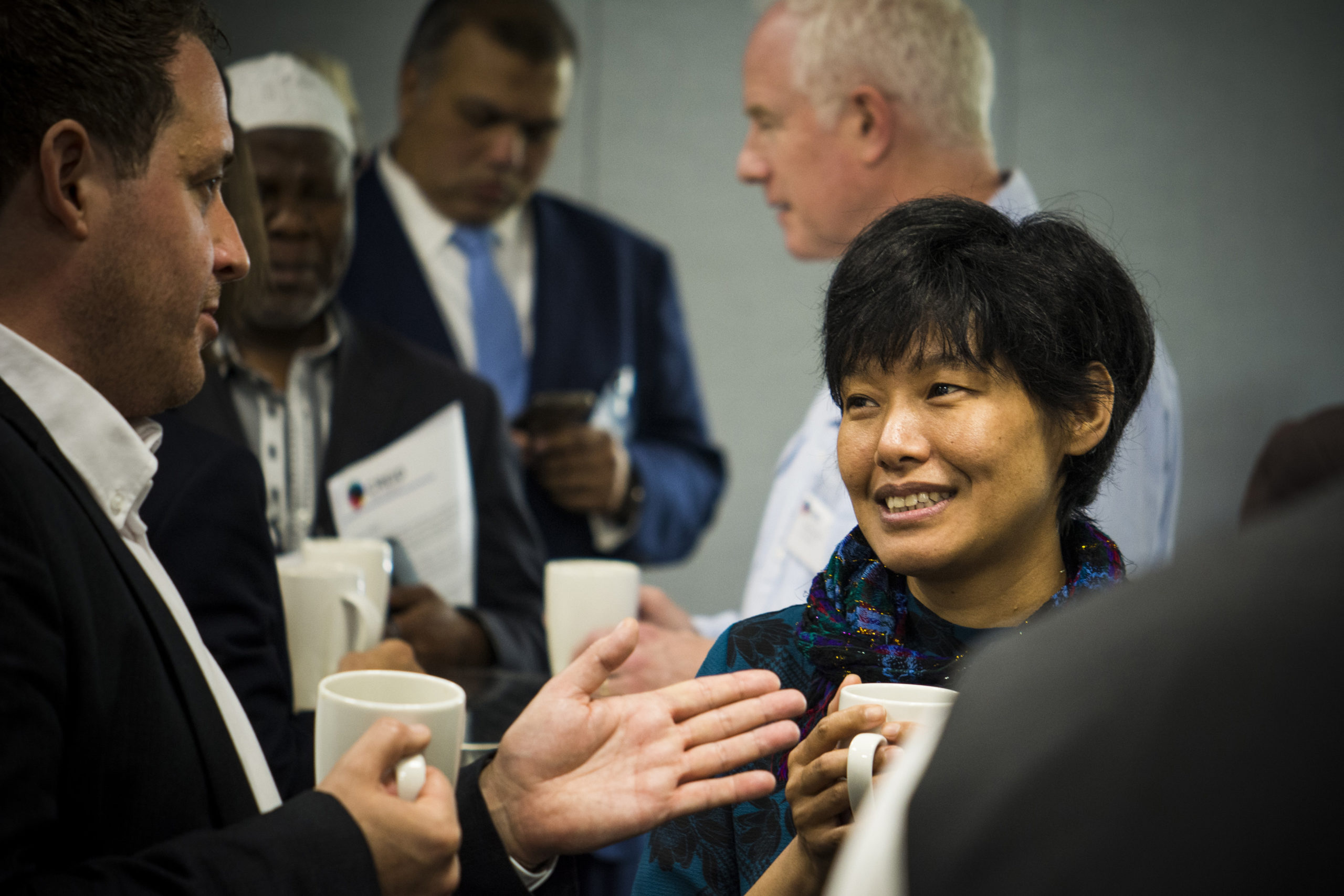This is what faith leaders, activists, charity workers and academic experts from across faiths and sectors gathered to discuss at the inaugural Forum for Freedom of Religion or Belief and Inclusive Development which took place on 11 June in London.

Participants at the Forum for Freedom of Religion or Belief and Inclusive Development. Credit: L.Bellers. All other photos from the event can be viewed on our Flickr account.
The Forum, which was organised by the Coalition for Religious Equality and Inclusive Development (CREID) convened by IDS in partnership with the Al-Khoei Foundation, CSW and Minority Rights Group, is sadly very timely.
Across the world, from New Zealand to Sri Lanka to Iraq to Myanmar, a broad spectrum of expressions of hate have been aimed at those considered the ‘religious other’. In Iraq, Christians, Yazidis, Sabean-Mandeans, Turkmen Shia and other religious minorities are facing an existential threat after being the target of extremist hate. In Myanmar, while the ongoing genocide of Rohingya Muslims is well documented, other Muslims as well as the Christian minority are also targeted by Burmese Buddhist nationalists.
IDS Research Fellow and CREID Director, Professor Mariz Tadros said: “Efforts to tackle extreme poverty can no longer ignore increasing persecution against religious minorities. Neither can they ignore everyday experiences of social, political and economic exclusion by state and non-state actors. The idea behind organising this Forum was to bring together a wider community of people to join us on this journey to create practical approaches which help build inclusive, socially cohesive communities who can benefit from interdependence regardless of religion or belief”.
For too long, religion was perceived as being too sensitive, too political
Over the course of the day, a number of speakers looked at why religion, faith or belief have never been comprehensively incorporated into humanitarian and development policy and planning despite the fact that a number of faith-based organisations are particularly active in aid and humanitarian work, there is a body of academic work on this issue and violations on the grounds of religion or belief are high on the agenda of rights activists.
Some pointed to the political and sensitive nature of the issue, some to the modernist, technocratic culture of major players in the global development community which treat religion as a discrete realm and/or irrelevant to the business of aid and development cooperation, whilst others pointed to the potential for dangerous “unintended” consequences which could result from highlighting or collecting data on people’s faith, particularly those from minority groups, in contexts where these very groups are being targeted.
Understanding the historical context is important, but there was no doubt about the shared sense of urgency in addressing this gap between inclusive development and FoRB amongst those present at the event, particularly given the growing intensification across the world of violence and persecution against religious minorities, fuelled by religious extremism and ultra-nationalism.

Delegates chatting during a break at the Forum on Freedom of Religion or Belief and Inclusive Development. Credit. L. Bellers. All other photos from the event can be viewed on our Flickr account.
What practical steps can be taken to address the intersecting and complex relationship between religious inequality and poverty?
The emerging CREID programme proposes five programmatic areas of focus, which were discussed as part of the programme for the day:
1. Mainstreaming awareness of FoRB in development, with a specific focus on the merits and pitfalls of data disaggregation
Data and evidence are essential for any form of policy, planning and implementation, and information about specific minorities and their needs could help make health, education or other public services more effective. But disaggregated data in the wrong hands can be used against vulnerable minority groups. Their vulnerability may also mean that people are less willing to disclose their identity, which means data could be incomplete or inaccurate, and so less helpful.
Watch the panel discussion on data disaggregation online.
2. Interfaith service delivery, with a particular focus on whether poverty alleviation can reduce the appeal of extremism
In some contexts there is a strong connection between the appeal of extremist groups and extreme poverty: these groups can provide social status, protection, group identity and in many cases hard cash, including salaries. It was also clear from speakers sharing experiences from Nigeria, Myanmar and Syria that poverty should be understood as incorporating far more than an absence of income or material comfort. With the significance of psychological and emotional factors such as fear, anger, trauma, and the desire for revenge in contexts where people have experienced significant discrimination and violence, make reconciliation, rehabilitation and justice as important a consideration as poverty alleviation.
3. Monitoring and countering hate speech and violence
Speakers from Iraq and Pakistan shared their experiences of the fluid and constantly changing nature of the incitement of hate which crosses over offline and online boundaries, including the widespread use of Facebook for spreading hate speech, the rise of cyber armies and increasing digital surveillance, which foster a climate of fear and a culture of impunity. Control and keeping track of content will always be outpaced by its production whilst regulating hate speech is fraught with difficulties, since this can potentially seriously impinge on freedom of expression, and is increasingly being used by states to close down criticism and calls for accountability. It was proposed that we focus our attention on the consumption of content (rather than its production), such as initiatives to help people identify fake content.
4. Social justice movements and the promotion of religious inclusivity
We were reminded of the very difficult contexts in which we will be working, such as complete state collapse post 2003 (in the case of Iraq) or an increasingly fraught civic space (Pakistan and Myanmar) which have a huge bearing on how social justice movements may evolve. In Iraq, questions of authority, legitimacy and responsibility – between state, the religious establishment or tribal leaders – are still being negotiated and discussed. In this setting, building a national coalition may be the best approach for achieving consensus across difference power brokers. Similarly, in Pakistan, where social movements tend to be identity specific and there is significant national security agenda, coalition building may prove to be an effective approach for building bridges and overcoming differences.
5. Cross-fertilisation between people and organisations from across different sectors and whether or how this could make FoRB a reality
The day finished with a round-table in which all participants were invited to share their thoughts on whether cross-fertilisation between people and organisations across sectors was key to making FoRB and inclusive development a reality. To a certain extent, the Forum itself was an exercise in cross-fertilisation, since it included representatives from over fifty different organisations including from academia, the civil service, government, NGOs, and faith organisations.
Clearly tackling extreme poverty alone will not address the complex nature of the challenges arising from the persecution of religious minorities, neither can redressing religious inequalities counter the multiple and often intersecting factors which sustain extreme poverty, including climate, economics, geo-strategic politics and proxy wars. But the momentum seems to be gathering to make a real contribution towards both these internecine and persistent issues, and members of CREID feel hopeful this emerging programme will have its part to play in this.
Speakers on the opening panel for the Forum on Freedom of Religion or Belief and Inclusive Development (in order of appearance)
- Mariz Tadros, Director, CREID
- Jan Figel, EU Special Envoy for Freedom of Religion or Belief outside the EU
- Melissa Leach, Director, IDS
- Michael Woolcock, Lead Social Scientist, Development Research Group, World Bank
- Mike Battcock, Civil Society Team Leader, Inclusive Societies Department, UK Department for International Development (DFID)
Watch all the keynote speeches online.
Interviews with speakers on Radio 4’s Sunday Programme
Award-winning journalist, Emily Buchanan, who chaired the final round table of the day also interviewed Mariz Tadros (IDS), Ayesha Siddiqa (SOAS South Asia Institute), Katherine Marshall (World Faiths Development Dialogue and Berkeley Center for Religion, Peace and World Affairs) and Jan Figel (EU Special Envoy for Freedom of Religion or Belief outside the EU) for Radio 4’s religious current affairs programme, ‘Sunday’.
Listen to the programme online on BBC Sounds (from 06min16sec)
